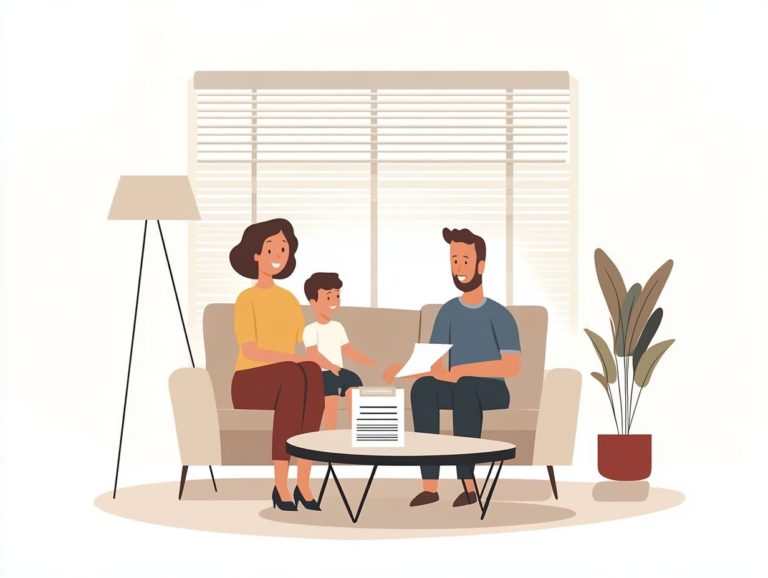How Does Home Insurance Protect Landlords?
Home insurance can feel overwhelming. Landlords face unique challenges and risks.
Understanding home insurance designed for landlords is vital for safeguarding your investment and ensuring your financial stability.
This article simplifies essential coverage options, including property damage and liability coverage. It emphasizes the advantages of having proper insurance. You ll also discover key factors to consider when selecting the right policy tailored to your needs.
Whether you re a seasoned landlord or just starting this journey, this guide gives you the essential knowledge you need to protect your property now!
Contents
Key Takeaways:

Understanding Home Insurance for Landlords
Understanding home insurance for landlords is essential for protecting your investment in rental properties while ensuring the safety and well-being of your tenants. It’s important to know what to know about landlord insurance types.
This tailored insurance is designed specifically for property investors. It offers coverage not only for property damage but also for protection if someone gets hurt on your property or if there’s a problem with a tenant.
With a range of policies available, it’s crucial to grasp the key aspects, including coverage options, limits, and exclusions. These elements can significantly impact your rental income and overall financial security.
What is Home Insurance for Landlords?
Home insurance for landlords, often known as landlord insurance, is a specialized coverage crafted for those who rent out residential units, whether they re long-term rentals or short-term home-sharing properties.
This distinctive insurance policy does more than just protect against property damage; it offers essential liability coverage in case a tenant or visitor gets injured on your property.
Unlike standard homeowners insurance, which typically covers residences you occupy, landlord insurance addresses the unique risks tied to rental situations. This includes loss of rent from covered damages and legal defense costs arising from tenant disputes.
Given the complexities of managing rental properties, choosing the right insurance policy is crucial for your financial security and peace of mind. It shields you from unexpected expenses related to property repairs, legal claims, or tenant defaults.
Coverage Options for Landlords
When considering landlord insurance, it’s crucial to understand the array of coverage options available.
This knowledge helps protect your rental properties from potential risks and liabilities.
Property Damage Coverage
Property damage coverage is an essential aspect of your landlord insurance. It offers vital financial protection against damages to your rental property from various perils, including fire, vandalism, and natural disasters.
This coverage typically protects against events such as windstorms, hail, and even certain tenant-related issues. By securing this coverage, you’ll be well-prepared to handle costly repairs that may arise from these incidents, safeguarding your investment and ensuring you can fulfill your obligations to your tenants.
With this insurance in place, you can alleviate the financial burden that often accompanies unforeseen challenges, promoting stable rental income and granting you peace of mind regarding the upkeep of your property.
Liability Coverage

Liability coverage in landlord insurance is your shield against legal claims that may arise from injuries or accidents occurring on your rental property. It offers both peace of mind and financial security for property owners like you.
This type of coverage typically safeguards you against claims for bodily injury, property damage, and legal defense costs. This ensures that you re not left financially devastated by unforeseen incidents.
For example, if a tenant slips and falls in a poorly maintained hallway, you could find yourself liable for their medical expenses or even damages related to lost wages. Without adequate liability coverage, the financial burden of such claims can escalate rapidly, leading to costly legal battles or settlements that could drain your resources.
Thus, investing in this coverage is not just crucial for protecting your assets; it also provides an important safety net against the unpredictable challenges of rental property management.
Loss of Rental Income Coverage
Loss of rental income coverage is a critical aspect of landlord insurance. It ensures that you receive financial compensation for rental income lost during times when your units become uninhabitable due to covered damages.
This insurance is vital in the face of unexpected incidents like fire, water damage, or major structural issues that render your property temporarily unlivable.
Imagine a severe storm damaging your roof. Repairs could take weeks or even months. During this challenging period, you re confronted not only with the burden of repair costs but also the loss of rental income.
In such cases, this coverage serves as a financial safety net, offering you the essential support needed to manage ongoing expenses while you work to restore the property to a condition suitable for tenants.
Benefits of Home Insurance for Landlords
Home insurance offers several advantages for landlords that go far beyond simple financial safeguarding.
They provide you with peace of mind, ensuring that both your property and your tenants are protected from unexpected risks.
Protection Against Financial Loss
Landlord insurance offers essential protection against potential financial losses, covering potentially devastating costs related to property damage and lost rental income that may arise from unexpected events.
Consider the impact of unforeseen circumstances such as natural disasters, vandalism, or tenant-related issues; these can dramatically affect your financial stability as a landlord. By investing in comprehensive policies, you can effectively mitigate these risks and ease the recovery process.
Timely claims are crucial, as they enable prompt repairs or replacements, allowing you to restore your properties quickly and reduce vacancy periods.
Keep detailed records, like photos and repair estimates, to maximize your claims and ensure a smoother claims experience.
Peace of Mind for Landlords
Having the right landlord insurance policy in place brings you peace of mind, allowing you to focus on managing your rental units without the constant burden of potential liabilities.
This sense of tranquility not only enhances your effectiveness in daily operations but also helps you build stronger relationships with your tenants. When you feel secure in your coverage, you’re more likely to tackle challenges with a clear head, leading to improved communication and responsiveness to tenant concerns.
The emotional benefits of being insured extend into your decision-making processes, enabling you to take calculated risks that can elevate your properties or enhance tenant satisfaction. Ultimately, this harmonious balance nurtures a more stable rental environment, benefiting everyone involved.
Factors to Consider When Choosing Home Insurance

When selecting home insurance as a landlord, you must consider several critical factors to secure the right coverage and minimize the risks associated with your rental properties.
This thoughtful approach will ensure that your investments are adequately protected.
Don’t leave your financial future to chance! Take the time to research and find the best insurance policy tailored specifically for your needs.
Property Location and Risk Factors
The location of your rental property plays a crucial role in determining the type of landlord insurance you’ll need. Some areas are more susceptible to specific risks, like natural disasters or elevated crime rates.
For example, if your property is near coastal regions, you might face higher premiums due to the increased chances of hurricanes or flooding. Urban areas with higher crime rates could necessitate enhanced coverage options to guard against vandalism or theft.
You should also remember that local building codes can impose extra insurance requirements, influencing how you maintain or renovate your property. By ensuring compliance with these regulations, you protect your tenants and align your coverage with legal standards. This safeguards your investment and minimizes potential liabilities.
Cost of Coverage
Understanding the cost of coverage is essential when selecting landlord insurance, as premium rates can fluctuate significantly due to several factors. These include the level of coverage you choose and the characteristics of your property.
As a landlord, pay close attention to the specifics of your policy. Elements like coverage limits, deductibles, and additional coverage options can greatly impact your overall costs.
The risk profile of your property is also critical; for example, if your home is situated in a flood-prone area, expect to pay higher premiums than if it were in a low-risk zone.
Don’t wait! Regularly review and adjust your coverage limits and deductibles to save money and stay protected. Begin by comparing quotes from multiple providers and look for discounts, such as bundled policies or loyalty rewards, as these can lead to more favorable premium rates.
Additional Coverage Options
Additional coverage options are available if you want to elevate your insurance protection. This ensures you have comprehensive coverage that addresses the unique risks associated with your rental properties.
Consider adding flood insurance to safeguard against potential water damage, especially if your properties are in flood-prone areas. Emergency coverage can also be invaluable during unexpected disasters.
You can explore specialized policies tailored to unique rental situations, such as short-term rentals or properties catering to tenants with specific needs.
Take charge of your coverage evaluate your needs today! This way, you can mitigate all potential risks and ensure your investments are well-protected.
Frequently Asked Questions
What is home insurance for landlords?
Home insurance for landlords is a type of policy that provides coverage and protection against financial losses related to a rental property. It typically covers damages to the physical structure, personal property, and liability risks.
What does home insurance protect landlords from?
Home insurance protects landlords from various risks and potential losses, such as damages to the property caused by natural disasters, vandalism, and tenant negligence. It also covers liability risks, including lawsuits from injured tenants or guests on the property, highlighting the role of home insurance in renting.
How does home insurance help landlords financially?
Home insurance helps landlords financially by providing coverage for repair or replacement costs for damages to the rental property. To understand what home insurance covers, it also helps cover legal fees and settlements in the event of a liability claim, protecting landlords’ financial assets.
Do landlords need home insurance if they have a tenant’s insurance?
Yes, landlords still need home insurance even if their tenants have renter’s insurance. A tenant’s insurance only covers their personal belongings and liability, not the structure or property owned by the landlord.
Can landlords customize their home insurance coverage?
Yes, landlords can often customize their home insurance coverage to fit their specific needs and budget. They can add additional coverage options such as landlord liability insurance, loss of rental income, and coverage for specific types of risks.
Is home insurance required for landlords?
Home insurance isn’t legally required for landlords. However, it’s strongly recommended to protect their investments and financial assets.
Don’t forget that many mortgage lenders will insist on home insurance as part of your loan agreement!




